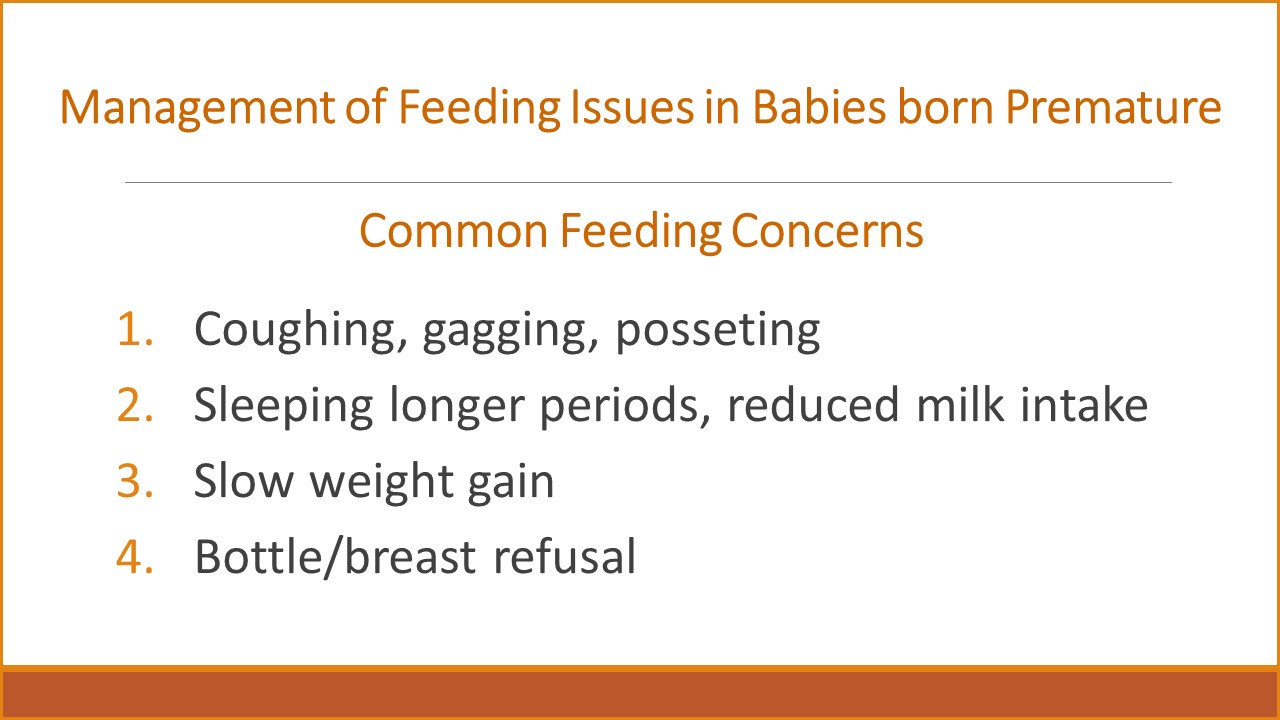Management of feeding issues in babies born preterm by Colleen Oliver, Neonatal Clinical Specialist
 Anthea Talliopoulos, APD
Anthea Talliopoulos, APD
Navigating feeding issues in babies born preterm can be complicated, with the management and clinical issues varying significantly. Feeding issues can be difficult related to an incoordination of the suck-swallow action, short bursts of sucks followed by long pauses for breathing (which may warrant nasogatric tube top-ups), immature oral reflexes, and gut immaturity. Delayed attainment of oral feeding skils, sensory difficulties, and behavioural feeding problems can further increase feeding difficulty and parental stress.
Managing these feeding issues requires experience and expertise, which Neonatal Clinical Specialist Dietitian Colleen Oliver provides, discussing common red flags and feeding concerns, clinical monitoring, the introduction of solids and practical food ideas for parents. Common feeding concerns include coughing, gagging, posseting, longer periods of sleep with reduced milk intake and dream feeding, slow weight gain, and bottle/breast refusal. Colleen outlines the clinical issues with the use of a case study, discussing the clear importance of working amongst a mutlidisciplinary team, including a speech pathologist, to best address these feeding concerns.
When solid introduction is considered, caution should be exercised in introducing solids too early as this often displaces the volume of milk consumed, reducing the total energy intake of the infant. Focusing on high iron foods is critical, with iron and vitamin D supplementation being recommended under the supervision of a specialist dietitian.
Providing individualised management and assessment is crucial, with current research indicating that preterm infants are a highly variable population group, with timing of the achievement of developmental milestones varying considerably.
Summary:
- Navigating feeding issues in babies born preterm can be complicated, with the management and clinical issues varying significantly, and are related to an incoordination of the suck-swallow action, short bursts of sucks followed by long pauses for breathing (which may warrant nasogatric tube top-ups), immature oral reflexes, and gut immaturity.
- Common feeding concerns include coughing, gagging, posseting, longer periods of sleep with reduce milk intake and dream feeding, slow weight gain, and bottle/breast refusal.
- In tracking weight and growth, Z scores can be useful in babies who are very small and lie 3rd percentile on standard growth charts. Fenton growth charts and the WHO growth charts (corrected for prematurity) can be useful.
- It is crucial that management is individualised and that solids are not introduced too early as this can impact total energy intake and the subsequent growth of the infant.
Colleen Oliver is a Clinical Specialist Dietitian working in the Neonatal Unit at the Royal Women’s Hospital in Melbourne. She has over 20 years of paediatric experience working in children’s hospitals across Australia and the UK and currently works with some of the most vulnerable infants born prematurely and their families. She is involved in clinical neonatal nutrition research and infant feeding policy development. Colleen is also a Steering Committee member of the Australasian Neonatal Dietitians Network (ANDiN), a support network founded in 2016 for neonatal dietitians to share knowledge and improve clinical skills and enhance evidence-based practice in neonatal nutrition.
To register for the presentation and associated documents including the assessment quiz click here

